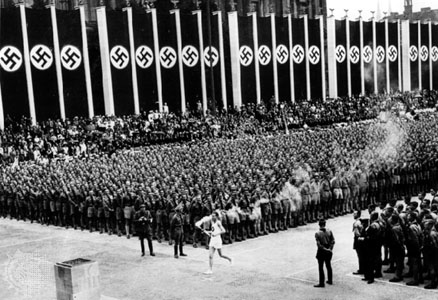- Siegfried Eifrig
Siegfried Eifrig (Born
February 6 ,1910 Berlin ,Germany – DiedJune 23 ,2008 ) was a German track and field athlete who ran the last leg of the inaugural Olympic Torch rally in the1936 Summer Olympics .Infobox Person
name = Siegfried Eifrig |right
|right
caption = Siegfried Eifrig bearing the Olympic flame, Berlin 1936
birth_date = February 6, 1910
birth_place = Berlin, Germany
death_date = June 23, 2008
death_place =
other_names =
known_for = Olympic Torch Bearer
nationality = GermanyBiography
At the age of 26, Siegfried Eifrig was chosen to carry the Olympic Flame which lit the cauldron at the
1936 Summer Olympics . His relay began at Unter den Linden and made its way to Olympiastadion in Berlin. Eifrig did not make the German Olympic team. However, he was a talented runner and a member of the Charlottenburg Athletic Club. With his blond hair, blue eyes, and tall, athletic body, Eifrig was chosen to embody the Nazi's ideal Aryan athlete. [http://www.historylearningsite.co.uk/1936_berlin_olympics.htm ::The 1936 Berlin Olympics:: ] ]Several years after the Olympic Games, Eifrig was placed into the Wehrmacht where he fought in North African Campaign. During World War II he was taken as a Prisoner of war by the British Army where he was held for the rest of the war. [http://news.bbc.co.uk/1/hi/world/europe/7330949.stm BBC NEWS | World | Europe | The Olympic torch's shadowy past ] ]
Eifrig became critical of politicians who sought to exploit the flame. He saw China's 2008 plan to carry the torch across the summit of Mount Everest as a "pointless gesture that makes a nonsense of the relay as an athletic challenge." Eifrig told the BBC that he had been "saddened by the controversy this year's relay [had] attracted ... it ought to be kept a purely sporting affair."
See also
*
1936 Summer Olympics
*Olympia (1938 film)
*Olympic Torch Relay References
Wikimedia Foundation. 2010.
